转基因食物利弊英语作文
- 格式:docx
- 大小:8.16 KB
- 文档页数:2

转基因食品的危害英语作文Genetically modified foods, also known as GM foods, have been a topic of controversy for many years. Many people believe that these foods pose serious health risks to consumers. 。
First and foremost, one of the main concerns about GM foods is their potential to cause allergic reactions in humans. Since these foods contain genes from other organisms, there is a possibility that they could trigger allergies in people who consume them.In addition, there is also a fear that GM foods may have negative effects on the environment. For example, there is a concern that the genes from GM crops could spread to other plants, leading to unintended consequences for the ecosystem.Furthermore, some critics argue that the long-term health effects of consuming GM foods are still unknown.Without sufficient research, it is difficult to determine the potential risks that these foods may pose to humanhealth over time.Moreover, there is a worry that the use of GM foods may lead to an increase in the use of herbicides and pesticides. This could have detrimental effects on both human healthand the environment.In conclusion, the potential hazards of genetically modified foods cannot be overlooked. It is important for consumers to be aware of these risks and to advocate for more thorough testing and regulation of GM foods.。
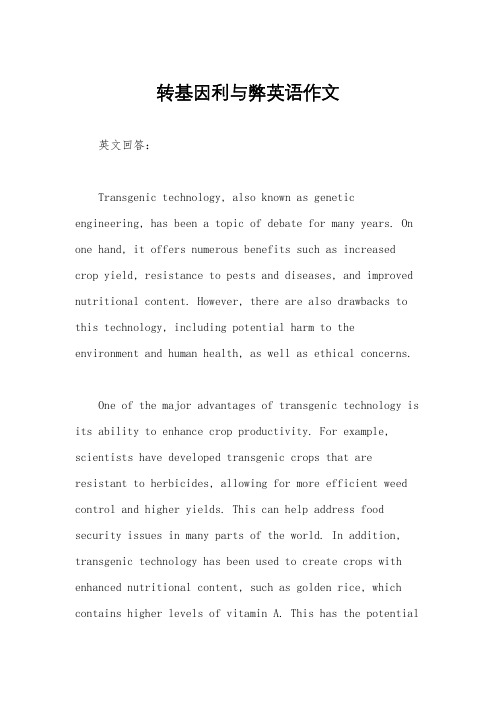
转基因利与弊英语作文英文回答:Transgenic technology, also known as genetic engineering, has been a topic of debate for many years. On one hand, it offers numerous benefits such as increased crop yield, resistance to pests and diseases, and improved nutritional content. However, there are also drawbacks to this technology, including potential harm to the environment and human health, as well as ethical concerns.One of the major advantages of transgenic technology is its ability to enhance crop productivity. For example, scientists have developed transgenic crops that are resistant to herbicides, allowing for more efficient weed control and higher yields. This can help address food security issues in many parts of the world. In addition, transgenic technology has been used to create crops with enhanced nutritional content, such as golden rice, which contains higher levels of vitamin A. This has the potentialto address malnutrition in developing countries.However, there are also concerns about the potential negative impacts of transgenic technology. For example, the use of genetically modified organisms (GMOs) in agriculture has raised concerns about the potential for unintended harm to the environment, such as the development of herbicide-resistant weeds and the loss of biodiversity. There are also concerns about the potential health risks of consuming GMOs, although the scientific consensus is that GMOs currently on the market are safe to eat.In addition to environmental and health concerns, there are also ethical considerations surrounding transgenic technology. For example, some people believe that it is wrong to manipulate the genetic makeup of living organisms, and that doing so could have unforeseen consequences. There are also concerns about the corporate control of transgenic technology, with some critics arguing that it could lead to the concentration of power and wealth in the hands of a few large corporations.In conclusion, transgenic technology has the potentialto offer significant benefits, such as increased cropyields and improved nutritional content. However, there are also drawbacks and concerns that need to be carefully considered. It is important to weigh the potential benefits against the potential risks and to proceed with caution when using transgenic technology.中文回答:转基因技术,也被称为基因工程,多年来一直是一个争论的话题。
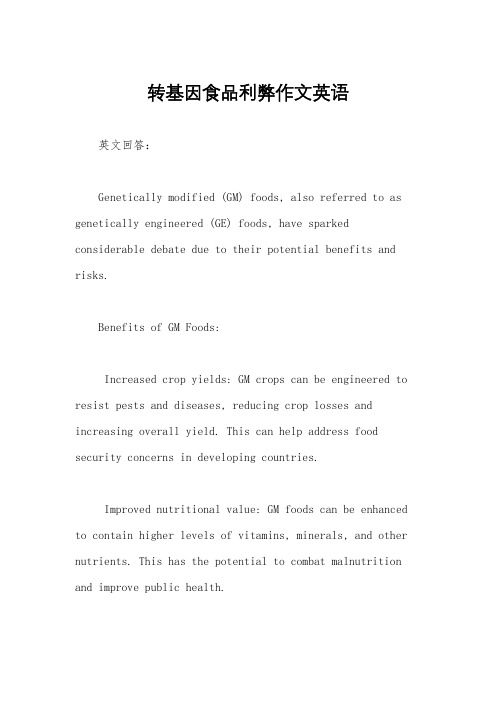
转基因食品利弊作文英语英文回答:Genetically modified (GM) foods, also referred to as genetically engineered (GE) foods, have sparked considerable debate due to their potential benefits and risks.Benefits of GM Foods:Increased crop yields: GM crops can be engineered to resist pests and diseases, reducing crop losses and increasing overall yield. This can help address food security concerns in developing countries.Improved nutritional value: GM foods can be enhanced to contain higher levels of vitamins, minerals, and other nutrients. This has the potential to combat malnutrition and improve public health.Resistance to environmental stressors: GM crops can be engineered to tolerate drought, heat, and other environmental stressors. This can increase agricultural productivity in challenging environments and reducereliance on synthetic fertilizers and pesticides.Risks of GM Foods:Health concerns: Critics argue that the long-term health effects of consuming GM foods are not fully understood. Concerns include potential allergies, increased toxicity, and antibiotic resistance due to the insertion of foreign genes.Environmental impact: GM crops can cross-pollinate with non-GM varieties, potentially introducing novel genes into natural ecosystems. This raises concerns about unintended consequences on biodiversity and gene flow.Economic issues: The development and commercialization of GM seeds can involve significant intellectual property rights and control by biotechnology companies. This cancreate concerns about farmer autonomy and market competition.Weighing the Benefits and Risks:The debate over GM foods is complex and requirescareful consideration of the potential benefits and risks. While GM foods have the potential to address food security and improve nutrition, concerns about health and environmental impacts must be thoroughly evaluated through rigorous scientific research and oversight.中文回答:转基因食品利弊。
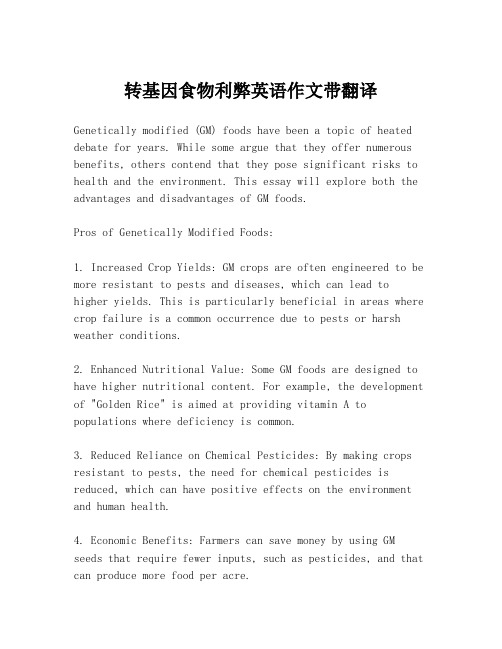
转基因食物利弊英语作文带翻译Genetically modified (GM) foods have been a topic of heated debate for years. While some argue that they offer numerous benefits, others contend that they pose significant risks to health and the environment. This essay will explore both the advantages and disadvantages of GM foods.Pros of Genetically Modified Foods:1. Increased Crop Yields: GM crops are often engineered to be more resistant to pests and diseases, which can lead to higher yields. This is particularly beneficial in areas where crop failure is a common occurrence due to pests or harsh weather conditions.2. Enhanced Nutritional Value: Some GM foods are designed to have higher nutritional content. For example, the development of "Golden Rice" is aimed at providing vitamin A to populations where deficiency is common.3. Reduced Reliance on Chemical Pesticides: By making crops resistant to pests, the need for chemical pesticides is reduced, which can have positive effects on the environment and human health.4. Economic Benefits: Farmers can save money by using GM seeds that require fewer inputs, such as pesticides, and that can produce more food per acre.Cons of Genetically Modified Foods:1. Potential Health Risks: There are concerns that GM foods may cause allergic reactions or other health problems, although scientific consensus has not yet fully established these risks.2. Environmental Impact: Critics argue that GM crops can crossbreed with wild plants, leading to the spread ofmodified genes in the wild, which could have unforeseen ecological consequences.3. Monoculture and Loss of Biodiversity: The widespread adoption of GM crops can lead to a reduction in agricultural biodiversity, as farmers may choose to grow only a few GM varieties.4. Corporate Control: Many GM seeds are patented by large corporations, which can lead to increased costs for farmers and a dependency on these companies for seeds.In conclusion, while GM foods offer the potential for increased food security and enhanced nutrition, there arevalid concerns regarding their safety and environmental impact. It is crucial for ongoing research and transparent labeling to ensure that the benefits of GM foods can be realized without compromising human health or the environment.翻译:转基因(GM)食品多年来一直是激烈争论的话题。
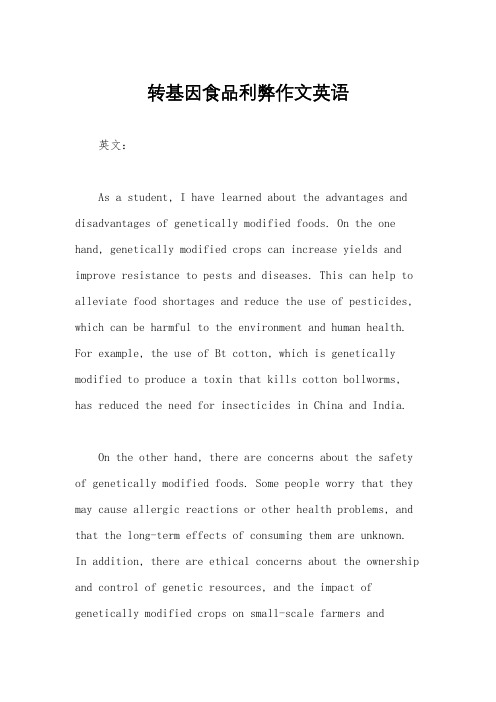
转基因食品利弊作文英语英文:As a student, I have learned about the advantages and disadvantages of genetically modified foods. On the one hand, genetically modified crops can increase yields and improve resistance to pests and diseases. This can help to alleviate food shortages and reduce the use of pesticides, which can be harmful to the environment and human health. For example, the use of Bt cotton, which is genetically modified to produce a toxin that kills cotton bollworms, has reduced the need for insecticides in China and India.On the other hand, there are concerns about the safety of genetically modified foods. Some people worry that they may cause allergic reactions or other health problems, and that the long-term effects of consuming them are unknown. In addition, there are ethical concerns about the ownership and control of genetic resources, and the impact of genetically modified crops on small-scale farmers andbiodiversity.Despite these concerns, I believe that genetically modified foods can be beneficial if they are carefully regulated and tested for safety. I think that consumers should have the right to know if their food contains genetically modified ingredients, so that they can make informed choices about what they eat. In addition, I think that more research is needed to understand the long-term effects of genetically modified foods on human health and the environment.中文:作为一名学生,我学习了关于转基因食品的利弊。
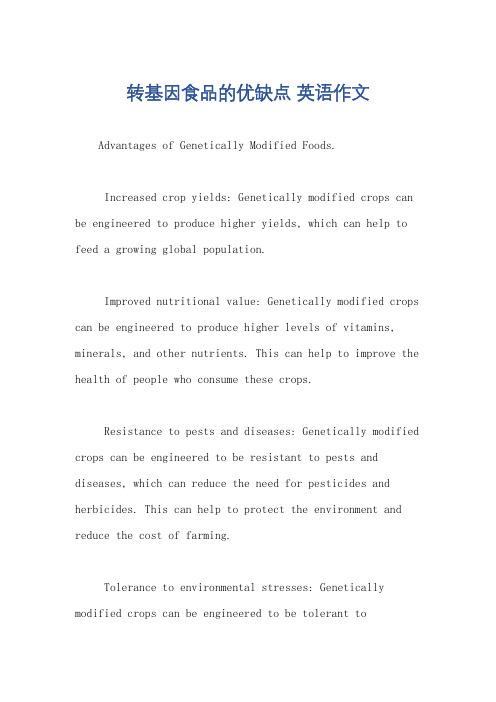
转基因食品的优缺点英语作文Advantages of Genetically Modified Foods.Increased crop yields: Genetically modified crops can be engineered to produce higher yields, which can help to feed a growing global population.Improved nutritional value: Genetically modified crops can be engineered to produce higher levels of vitamins, minerals, and other nutrients. This can help to improve the health of people who consume these crops.Resistance to pests and diseases: Genetically modified crops can be engineered to be resistant to pests and diseases, which can reduce the need for pesticides and herbicides. This can help to protect the environment and reduce the cost of farming.Tolerance to environmental stresses: Genetically modified crops can be engineered to be tolerant toenvironmental stresses such as drought, heat, and cold. This can help to ensure that crops can be grown in a wider range of climates, which can improve food security.Reduced food waste: Genetically modified crops can be engineered to have a longer shelf life, which can reduce food waste. This can help to save money and reduce the environmental impact of food production.Disadvantages of Genetically Modified Foods.Potential for unintended consequences: Genetically modified crops could have unintended consequences for the environment and human health. For example, genetically modified crops could cross-pollinate with wild plants, creating new superweeds that are resistant to herbicides.Potential for allergic reactions: Genetically modified crops could produce new proteins that could triggerallergic reactions in some people.Potential for antibiotic resistance: Some geneticallymodified crops contain genes that confer antibiotic resistance. This could make it more difficult to treat bacterial infections in humans and animals.Loss of biodiversity: Genetically modified crops could lead to a loss of biodiversity, as farmers may choose to grow a smaller number of high-yielding, genetically modified crops.Ethical concerns: Some people have ethical concerns about genetically modified foods, as they believe that itis wrong to alter the genetic makeup of plants and animals.中文回答:转基因食品的优点。
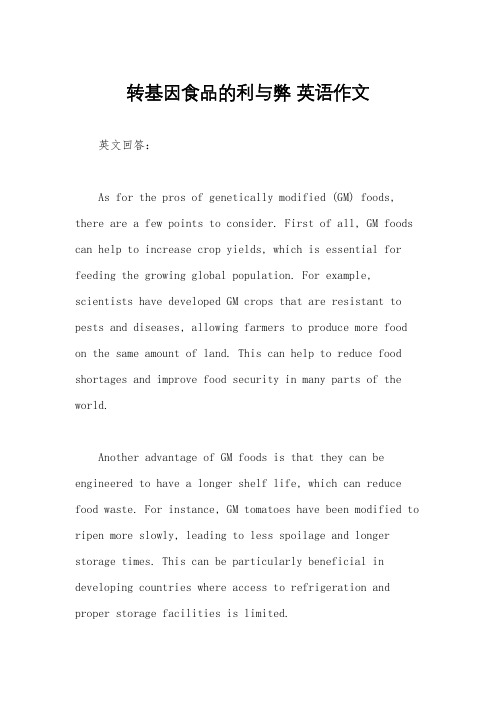
转基因食品的利与弊英语作文英文回答:As for the pros of genetically modified (GM) foods, there are a few points to consider. First of all, GM foods can help to increase crop yields, which is essential for feeding the growing global population. For example, scientists have developed GM crops that are resistant to pests and diseases, allowing farmers to produce more food on the same amount of land. This can help to reduce food shortages and improve food security in many parts of the world.Another advantage of GM foods is that they can be engineered to have a longer shelf life, which can reduce food waste. For instance, GM tomatoes have been modified to ripen more slowly, leading to less spoilage and longer storage times. This can be particularly beneficial in developing countries where access to refrigeration and proper storage facilities is limited.Furthermore, GM foods have the potential to be more nutritious and healthier. Scientists have been able to enhance the nutritional content of certain crops, such as adding more vitamins and minerals to rice. This can be especially beneficial for populations that suffer from malnutrition and dietary deficiencies.On the other hand, there are also some drawbacks to consider when it comes to GM foods. One of the main concerns is the potential for unintended harm to the environment and human health. For example, there is a fear that GM crops could crossbreed with wild plants, leading to the spread of modified genes into natural ecosystems. Additionally, there are worries about the long-term effects of consuming GM foods, as the full impact on human healthis not yet fully understood.Another drawback is the potential for corporate control over the food supply. Many GM seeds are patented by biotechnology companies, which can lead to a monopoly on the market and limited options for farmers. This can havenegative implications for small-scale farmers who may become dependent on a single company for their seeds and agricultural inputs.In conclusion, GM foods have the potential to address some of the world's food security and nutrition challenges, but they also come with potential risks to the environment and human health, as well as concerns about corporate control. It is important to carefully weigh the pros and cons of GM foods and consider the ethical, social, and environmental implications before fully embracing this technology.中文回答:说到转基因食品的利与弊,有一些要考虑的观点。

转基因食物利弊英语作文SANY标准化小组 #QS8QHH-HHGX8Q8-GNHHJ8-HHMHGN#What is GM food? Talk about the benefits and risks of GM food. GM foods,so called genetically modified foods,are the foods that are derived from genetically modified organisms. Genetically modified organisms have had specific changes introduced into their DNA by genetic engineering techniques. GM technology is the separation and decorated artificial genesinto the genome of organisms, and to gene expression, access to new traits of biological technology.Since this technology was practiced,genetically modified food has developed a 1983,world’s first case of successful cultivation is 1994,the . first case of GM food is1996,large-scale production has come into that,the amount of GM foods increased by 52 times each have shared a lot of advantages as time went crops are more productive and have a larger yield. They can offer more nutritional value and better flavor. What is more,a possibility that they could eliminate allergy-causing properties in some foods and inbuilt resistance to pests, weeds and disease. They are also more capable of thriving in regions with poor soil or adverse climates and remaining fresh ,at the same time,much danger has been put up all the way. For example,in August 1998,a British research institute reported that rats ate GM potatoes, which was insect-resistant transgenic potatoes produced by snowdrop lectin .And there was damage to internal organs and immune systems and this impeded the growth of from what we have mentionedabove,genetically modified foods has also exerted influence on the possible impact of human consumption and may affect the ecological environment,such as super weed problems,the impact of biodiversity and destruction of ecological is more serious,GM crops may expand to“genetic pollution”,which might destroy the biodiversity, leading to extinction of individual species,affect the hidden dangers of biological diversity and GM foods have yet to appear directly harmful to human cases.In my opinion,the benefits outweigh the potential risks .One one hand ,trust in food safety and regulatory systems .On the other hand,watch out the further safety evaluation and risk assessment.。

转基因食品的危害英语作文The Hazards of Genetically Modified Foods。
Genetically modified foods, also known as GMOs, have been a topic of controversy for many years. While some people argue that GMOs are safe and beneficial, others believe that they pose serious risks to human health and the environment. In this essay, we will explore the potential hazards of genetically modified foods and why they should be approached with caution.First and foremost, one of the main concerns surrounding GMOs is their potential impact on human health. Many scientists and health experts have raised concerns about the long-term effects of consuming genetically modified foods. For example, some studies have suggested that GMOs may contribute to the development of allergies, antibiotic resistance, and other health issues. Additionally, the use of genetic engineering to modify crops may lead to the production of new toxins or allergensthat could pose a risk to human health.Furthermore, there are concerns about the environmental impact of genetically modified foods. One of the most widely used GMOs is a type of corn that has been engineered to produce its own insecticide. While this may seem like a beneficial trait, it has raised concerns about thepotential harm to non-target insects and other wildlife. Additionally, the widespread use of GMOs has led to an increase in the use of herbicides and pesticides, which can have harmful effects on the environment and human health.Another issue to consider is the potential for genetic contamination. GMOs have the ability to cross-pollinate with non-GMO crops, leading to the unintentional spread of genetically modified traits. This can have serious consequences for farmers who wish to grow non-GMO crops, as well as for the biodiversity of natural ecosystems.In addition to these concerns, there are also ethical and social implications of genetically modified foods. Many people believe that GMOs represent a threat to foodsovereignty and the rights of farmers to save and exchange seeds. There are also concerns about the concentration of power and control in the hands of a few large biotechnology companies that dominate the GMO industry.In conclusion, the hazards of genetically modified foods are a complex and multifaceted issue that must be carefully considered. While some people argue that GMOs offer potential benefits such as increased crop yields and reduced pesticide use, it is important to approach this technology with caution. The potential risks to human health, the environment, and the social and ethical implications of GMOs must be carefully weighed against any potential benefits. Ultimately, the safety and long-term impact of genetically modified foods must be thoroughly researched and understood before they are widely embraced.。

转基因食品的危害英语作文英文回答:Genetically modified foods (GMFs) have become a staple in our modern food system, promising increased crop yields, reduced pesticide use, and enhanced nutritional value. However, concerns persist regarding their potential risks to human health and the environment.Health Concerns。
One primary concern is the possibility of allergic reactions or toxic effects from consuming GMFs. Critics argue that genetic modifications could introduce foreign proteins into food products that may trigger allergies or intolerances in susceptible individuals. Studies have reported allergic reactions to soy and corn that have been genetically modified to express proteins from other organisms.Another concern is the potential for antibiotic resistance transfer. Many GMFs are developed usingantibiotic-resistant genes as markers to facilitate gene selection. There are fears that these genes could transfer to bacteria in the human gut, making infections more difficult to treat.Environmental Concerns。

转基因食品的英语作文英文回答:As for genetically modified (GM) foods, I have quite a mixed opinion. On one hand, I understand the potential benefits of GM foods, such as increased crop yield and resistance to pests and diseases. This can be especially important in areas where food shortages are a major issue. For example, in some parts of Africa, GM crops have been developed to withstand drought and pests, which can help to ensure a more reliable food supply.However, on the other hand, I also have concerns about the potential risks and long-term effects of consuming GM foods. There is still ongoing debate and research about the safety of GM foods, and some studies have raised questions about their potential impact on human health and the environment. For instance, there are worries about the effects of GM crops on biodiversity and the potential for unintended consequences, such as the development ofsuperweeds or the harm to non-target insects.In addition, there are also ethical and economic considerations to take into account. For example, there are concerns about the control of GM seeds by large corporations and the potential impact on small-scale farmers. Moreover, there are questions about the labeling of GM foods and the consumer's right to know what they are eating.In conclusion, while I can see the potential benefits of GM foods, I also believe that it is important to proceed with caution and to continue researching and monitoring the impact of GM foods on human health and the environment.中文回答:对于转基因食品,我有着各种不同的看法。

What is GM food? Talk about the benefits and risks of GM food.GM foods,so called genetically modified foods,are the foods that are derivedfrom genetically modified organisms. Genetically modified organisms have had specific changes introduced into their DNA by genetic engineering techniques.GM technology is the separation and decorated artificial genes into the genomeof organisms, and to gene expression, access to new traits of biological technology.Since this technology was practiced,genetically modified food has developeda lot.In 1983,world’s first case of successful cultivation is tobacco.In 1994,the U.S. first case of GM food is tomatoes.In 1996,large-scale production has comeinto use.Since that,the amount of GM foods increased by 52 times eachyear.People have shared a lot of advantages as time went by.GM crops aremore productive and have a larger yield. They can offer more nutritional valueand better flavor. What is more,a possibility that they could eliminateallergy-causing properties in some foods and inbuilt resistance to pests, weedsand disease. They are also more capable of thriving in regions with poor soil or adverse climates and remaining fresh longer.Still,at the same time,much dangerhas been put up all the way. For example,in August 1998,a British researchinstitute reported that rats ate GM potatoes, which was insect-resistanttransgenic potatoes produced by snowdrop lectin .And there was damage tointernal organs and immune systems and this impeded the growth ofmice.Apart from what we have mentioned above,genetically modified foodshas also exerted influence on the possible impact of human consumption and may affect the ecological environment,such as super weed problems,the impact of biodiversity and destruction of ecological balance.What is more serious,GMdestroy the biodiversity, crops may expand to“genetic pollution”,which mightleading to extinction of individual species,affect the hidden dangers of biological diversity and GM foods have yet to appear directly harmful tohuman cases.In my opinion,the benefits outweigh the potential risks .One one hand ,trust in food safety and regulatory systems .On the other hand,watch out the further safety evaluation and risk assessment.。
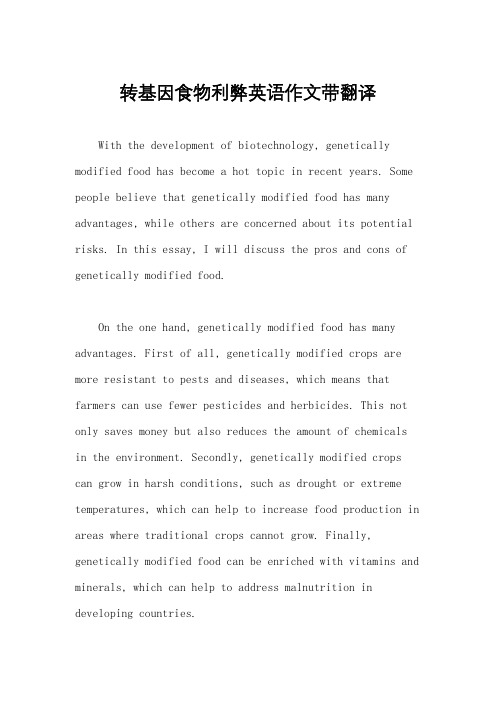
转基因食物利弊英语作文带翻译With the development of biotechnology, genetically modified food has become a hot topic in recent years. Some people believe that genetically modified food has many advantages, while others are concerned about its potential risks. In this essay, I will discuss the pros and cons of genetically modified food.On the one hand, genetically modified food has many advantages. First of all, genetically modified crops are more resistant to pests and diseases, which means that farmers can use fewer pesticides and herbicides. This not only saves money but also reduces the amount of chemicalsin the environment. Secondly, genetically modified crops can grow in harsh conditions, such as drought or extreme temperatures, which can help to increase food production in areas where traditional crops cannot grow. Finally, genetically modified food can be enriched with vitamins and minerals, which can help to address malnutrition in developing countries.On the other hand, genetically modified food also has some potential risks. One concern is that genetically modified crops may have unintended effects on the environment, such as crossbreeding with wild plants or harming beneficial insects. Another concern is that genetically modified food may have negative health effects on humans, such as allergic reactions or the development of antibiotic resistance. Finally, some people are concerned about the long-term effects of genetically modified food on human health, as there is still much that is unknown about the potential risks.In conclusion, genetically modified food has both advantages and disadvantages. While it has the potential to increase food production and address malnutrition, it also poses potential risks to the environment and human health. As such, it is important to carefully consider the benefits and risks of genetically modified food before making any decisions about its use. Only by weighing the pros and cons can we ensure that we are making informed choices about the food we eat and the impact it has on our world.随着生物技术的发展,转基因食物近年来成为热门话题。

转基因危害英语作文英文回答:Genetically Modified Organisms (GMOs) have sparked a fierce debate, with proponents touting their potential benefits for food security and agriculture, while critics raise concerns about their safety and long-term effects on human health and the environment.Genetically modified foods are created by altering the DNA of an organism, typically by inserting a gene from another species. Scientists have successfully created GMOs with traits such as resistance to pests, herbicides, and drought, and enhanced nutritional value. Thesemodifications aim to increase crop yields, reduce pesticide use, and improve nutritional intake in developing countries.However, concerns about GMOs persist. Critics arguethat there is insufficient long-term safety data, and that genetically modified foods may have unintended consequencesfor human health and the environment. Some studies have linked GMOs to allergies, antibiotic resistance, and digestive issues, while others have raised concerns about the potential for gene transfer to wild plants, creating superweeds or disrupting ecosystems.Moreover, the commercialization of GMOs has raised ethical and social justice concerns. Critics argue that companies like Monsanto have a monopoly over the seed market, controlling the food supply and potentially squeezing out small farmers. They also point out that GMOs are often grown in developing countries where regulatory systems may be weaker, raising concerns about exploitation and potential harm to local populations.The GMO debate is complex and involves scientific, ethical, and social considerations. While GMOs may offer potential benefits for food security and agriculture, it is crucial to proceed with caution and address the concerns raised by critics. Thorough research, long-term monitoring, and robust regulatory frameworks are essential to ensure the safety of GMOs and mitigate potential risks.中文回答:转基因生物(GMO)引发了激烈的争论,支持者大力宣扬其对粮食安全和农业的潜在好处,而批评者则对其安全性以及对人类健康和环境的长期影响表示担忧。

转基因食物的好处与坏处英语作文In recent years, genetically modified (GM) foods have becomea staple in many diets around the world. The technologybehind GM foods has the potential to revolutionizeagriculture and feed a growing global population. However,this advancement also comes with its share of concerns. Here, we will explore the advantages and disadvantages of GM foods.Pros of Genetically Modified Foods:1. Increased Yield: GM crops are engineered to grow fasterand yield more, which can help meet the demands of a growing population. This is particularly beneficial in regions where food scarcity is a significant issue.2. Pest Resistance: Many GM crops have been modified to be resistant to pests, reducing the need for chemical pesticides. This not only helps in protecting the environment but alsocuts down on production costs.3. Herbicide Tolerance: Some GM plants are designed to withstand certain herbicides, allowing farmers to use these chemicals to kill weeds without harming the crop.4. Nutritional Enhancement: Genetic modification can enhance the nutritional content of foods. For example, Golden Rice is a GM variety that is fortified with vitamin A to help combat vitamin A deficiency in developing countries.5. Climate Resilience: GM technology can be used to develop crops that are more resistant to harsh weather conditions, such as droughts or floods, ensuring a more stable food supply.Cons of Genetically Modified Foods:1. Unknown Long-Term Effects: The long-term health effects of consuming GM foods are not fully understood. There is ongoing debate about the potential risks to human health.2. Environmental Impact: There are concerns that GM crops could crossbreed with wild plants, potentially leading to the creation of 'superweeds' that are resistant to herbicides.3. Monopoly by Seed Companies: The patenting of GM seeds by a few large companies can lead to a monopoly, which may drive up the cost of seeds and limit the choices available to farmers.4. Loss of Biodiversity: The widespread use of GM crops can lead to a reduction in agricultural biodiversity, as traditional varieties of crops are replaced by a few GM varieties.5. Ethical Concerns: Some people have ethical objections to the manipulation of genetic material, arguing that it is'playing God' with the natural world.In conclusion, while GM foods offer potential benefits suchas increased yields and enhanced nutrition, there are also significant concerns about their safety, environmental impact, and ethical implications. As the technology continues to advance, it is crucial for scientists, policymakers, and consumers to engage in an informed dialogue to ensure thatthe potential of GM foods is harnessed responsibly and sustainably.。
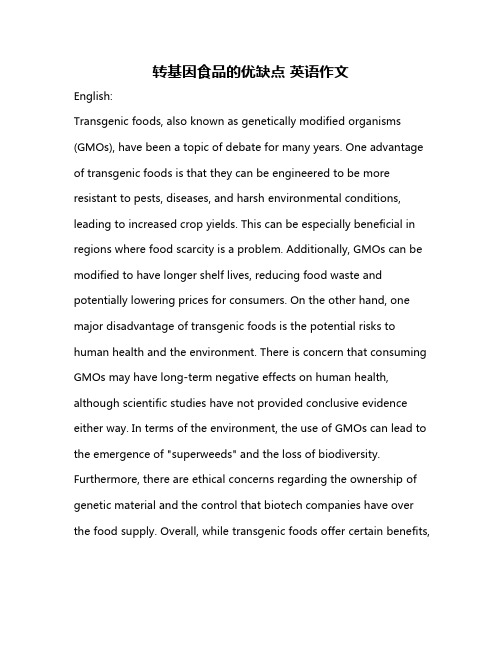
转基因食品的优缺点英语作文English:Transgenic foods, also known as genetically modified organisms (GMOs), have been a topic of debate for many years. One advantage of transgenic foods is that they can be engineered to be more resistant to pests, diseases, and harsh environmental conditions, leading to increased crop yields. This can be especially beneficial in regions where food scarcity is a problem. Additionally, GMOs can be modified to have longer shelf lives, reducing food waste and potentially lowering prices for consumers. On the other hand, one major disadvantage of transgenic foods is the potential risks to human health and the environment. There is concern that consuming GMOs may have long-term negative effects on human health, although scientific studies have not provided conclusive evidence either way. In terms of the environment, the use of GMOs can lead to the emergence of "superweeds" and the loss of biodiversity. Furthermore, there are ethical concerns regarding the ownership of genetic material and the control that biotech companies have over the food supply. Overall, while transgenic foods offer certain benefits,the potential risks and uncertainties associated with their consumption raise important questions about their widespread use.Translated content:转基因食品,也称为基因改良生物(GMO),多年来一直是争论的话题。
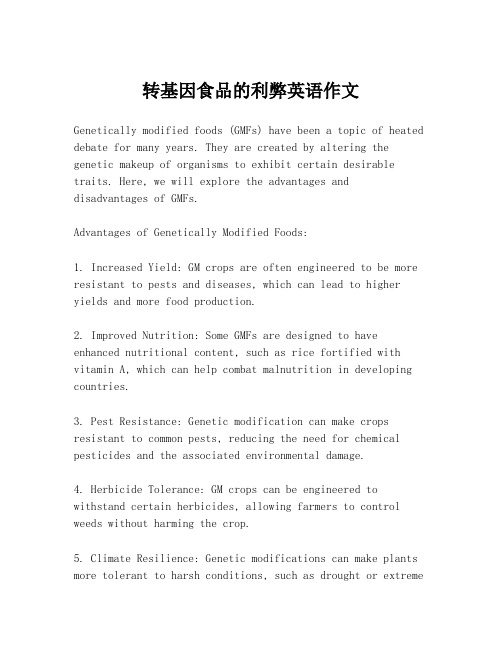
转基因食品的利弊英语作文Genetically modified foods (GMFs) have been a topic of heated debate for many years. They are created by altering the genetic makeup of organisms to exhibit certain desirable traits. Here, we will explore the advantages and disadvantages of GMFs.Advantages of Genetically Modified Foods:1. Increased Yield: GM crops are often engineered to be more resistant to pests and diseases, which can lead to higher yields and more food production.2. Improved Nutrition: Some GMFs are designed to have enhanced nutritional content, such as rice fortified with vitamin A, which can help combat malnutrition in developing countries.3. Pest Resistance: Genetic modification can make crops resistant to common pests, reducing the need for chemical pesticides and the associated environmental damage.4. Herbicide Tolerance: GM crops can be engineered to withstand certain herbicides, allowing farmers to control weeds without harming the crop.5. Climate Resilience: Genetic modifications can make plants more tolerant to harsh conditions, such as drought or extremetemperatures, which is crucial in the face of climate change.Disadvantages of Genetically Modified Foods:1. Health Concerns: There are concerns that GMFs may have unforeseen effects on human health, although extensive research has not yet found conclusive evidence.2. Environmental Impact: The use of herbicide-tolerant crops can lead to an increase in herbicide use, potentially harming non-target organisms and ecosystems.3. Loss of Biodiversity: The widespread adoption of GM crops can lead to a reduction in agricultural biodiversity, as traditional crop varieties are replaced.4. Economic Issues: GM seeds are often patented, which can lead to increased costs for farmers and a dependence on seed companies.5. Ethical Considerations: Some people have ethical objections to the manipulation of an organism's genetic code, viewing it as "playing God."In conclusion, genetically modified foods offer potential benefits such as increased food security and improved nutrition. However, they also come with risks that need to be carefully managed. It is essential for ongoing research and regulation to ensure that the benefits of GMFs can berealized while minimizing their potential drawbacks.。

转基因食品的利与弊英语作文Genetically modified foods, or GMOs, have been a topic of debate for quite some time now. On one hand, they offer many benefits that cannot be ignored. For example, GMOs can help increase crop yields and reduce the use of pesticides. This means that farmers can produce more food with less effort and resources. Additionally, GMOs can also help create crops that are resistant to diseases and pests, ensuring a more stable food supply. These advantages are hard to ignore and make a strong case for the use of genetically modified foods.However, there are also drawbacks to genetically modified foods that cannot be overlooked. One major concern is the potential health risks associated with consuming GMOs. Some studies have suggested that genetically modified foods may have negative effects on human health, such as allergies and organ damage. Furthermore, GMOs may also harm the environment by contaminating non-GMO crops and disrupting natural ecosystems. These risks are significantand raise serious questions about the safety and sustainability of genetically modified foods.While the benefits of genetically modified foods are clear, it is important to consider the potential risks as well. It is crucial that we have a thorough understanding of the long-term effects of GMOs on human health and the environment before fully embracing their use. Additionally, it is important to ensure that proper regulations and labeling are in place to allow consumers to make informed choices about the foods they consume.In conclusion, genetically modified foods offer both advantages and disadvantages. While they can help increase crop yields and reduce the use of pesticides, there are also concerns about their potential health risks and environmental impact. It is important to carefully consider these factors and conduct further research before making a final judgment on the use of genetically modified foods.。

关于转基因食品的利英语作文The Pros and Cons of Genetically Modified Foods.Genetically modified (GM) foods have become a topic of intense debate in recent years, sparking conversations about their potential benefits and risks. While the technology behind GM foods offers the promise of addressing global hunger and environmental challenges, it also raises concerns about long-term health effects and ecological impacts.Increased Crop Yields and Resistance to Pests.One of the primary benefits of GM foods is their potential to increase crop yields. By inserting genes from other species, scientists can create plants that are resistant to pests, herbicides, and adverse environmental conditions. This can lead to higher yields, even in conditions that would normally limit crop growth. For example, GM cotton varieties have been developed that areresistant to the cotton bollworm, a major pest that can decimate cotton crops. Similarly, GM corn and soybeans have been engineered to tolerate glyphosate, a widely used herbicide, allowing farmers to control weeds withoutharming their crops.Reducing the Use of Pesticides.GM crops can also help reduce the need for pesticides, which are often harmful to both human health and the environment. By engineering plants to be resistant to pests, farmers can reduce their reliance on chemical pesticides. This not only lowers the environmental impact of farmingbut also reduces the risk of pesticide residue on food, which can pose health risks to consumers.Addressing Global Hunger.Another potential benefit of GM foods is their role in addressing global hunger. As the world's population continues to grow, so does the demand for food. GM crops, with their increased yields and resistance to adverseconditions, could help meet this demand, particularly in areas where traditional crops struggle to thrive. By providing a more stable food supply, GM foods could contribute to global food security and reduce hunger.Environmental Benefits.GM crops can also have environmental benefits. For example, GM varieties of rice and sorghum have been developed that can grow in saline or drought-prone areas, expanding the range of suitable cropland. This not only increases food production but also helps preserve natural habitats by reducing the need to convert additional landfor farming.Potential Health Risks.Despite these benefits, GM foods also raise concerns about potential health risks. One of the main concerns is the long-term impact of consuming GM foods on human health. While many studies have found no significant differences between GM and non-GM foods in terms of safety andnutrition, some studies have suggested that GM foods may cause allergic reactions or affect the digestive system. These findings, however, are still controversial and require further research.Ecological Impacts.Another concern is the ecological impact of GM crops. The introduction of GM varieties into the environment could potentially disrupt natural ecosystems by altering the interactions between plants, insects, and other organisms. For example, GM crops that are resistant to pests could lead to an increase in the population of those pests, potentially causing harm to non-GM crops or wild plants. Additionally, the spread of GM genes into related species through cross-pollination could lead to the loss of genetic diversity, affecting the resilience of natural ecosystems.Consumer Choice and Labeling.Finally, there are also issues related to consumer choice and labeling. Consumers have the right to know whatthey are eating and to choose whether or not to consume GM foods. However, the labeling of GM foods is often inconsistent and can be misleading. This lack of transparency can make it difficult for consumers to make informed decisions about their food choices.In conclusion, GM foods present both opportunities and challenges. The potential benefits of increased yields, reduced pesticide use, and addressing global hunger are significant. However, the potential health and ecological risks, as well as issues related to consumer choice and labeling, must also be carefully considered. As we continue to debate the merits of GM foods, it is important to approach the topic with an open mind and a commitment to scientific rigor. Only through careful research and public engagement can we ensure that GM foods are used responsibly and to the benefit of all.。
What is GM food? Talk about the benefits and risks of GM food. GM foods,so called genetically modified foods,are the foods that are derived from genetically modified organisms. Genetically modified organisms have had specific changes introduced into their DNA by genetic engineering techniques. GM technology is the separation and decorated artificial genes into the genome of organisms, and to gene expression, access to new traits of biological technology. Since this technology was practiced,genetically modified food has developed a lot.In 1983,world’s first case of successful cultivation is tobacco.In 1994,the U.S. first case of GM food is tomatoes.In 1996,large-scale production has come into use.Since that,the amount of GM foods increased by 52 times each year.People have shared a lot of advantages as time went by.GM crops are more productive and have a larger yield. They can offer more nutritional value and better flavor. What is more,a possibility that they could eliminate allergy-causing properties in some foods and inbuilt resistance to pests, weeds and disease. They are also more capable of thriving in regions with poor soil or adverse climates and remaining fresh longer.Still,at the same time,much danger has been put up all the way. For example,in August 1998,a British research institute reported that rats ate GM potatoes, which was insect-resistant transgenic potatoes produced by snowdrop lectin .And there was damage to internal organs and immune systems and this impeded the growth of mice.Apart from what we have mentioned above,genetically modified foods has also exerted influence on the possible impact of human consumption and may affect the ecological environment,such as super weed
problems,the impact of biodiversity and destruction of ecological balance.What is more serious,GM crops may expand to“genetic pollution”,which might destroy the biodiversity, leading to extinction of individual species,affect the hidden dangers of biological diversity and GM foods have yet to appear directly harmful to human cases.
In my opinion,the benefits outweigh the potential risks .One one hand ,trust in food safety and regulatory systems .On the other hand,watch out the further safety evaluation and risk assessment.。